- Home
- Jason Webster
The Killing of El Niño Jesús
The Killing of El Niño Jesús Read online
Contents
Cover
About the Book
About the Author
Also by Jason Webster
Title Page
Author’s Note
The Killing of el Niño Jesús
Sneak Preview
Copyright
About the Book
It is Christmas day, and Max Cámara has a hangover. He’s due in his hometown of Albacete for lunch with his grandfather Hilario, but instead he’s called out to a local nightclub where things have gone horribly wrong. There, it’s still very much the morning after the night before. Cámara must untangle a tragic truth from a cast of extraordinary nativity characters, fresh from a performance the likes of which he’s never come across before.
About the Author
Brought up in England, Jason Webster lived for many years in Spain. His acclaimed non-fiction books about Spain include Duende: A Journey in Search of Flamenco; Andalus: Unlocking the Secrets of Moorish Spain; Guerra: Living in the Shadows of the Spanish Civil War; Sacred Sierra: A Year on a Spanish Mountain and the forthcoming The Spy with 29 Names. He is also the author of the Max Cámara series of crime novels, the first of which, Or the Bull Kills You, was longlisted for the CWA Specsavers Crime Thriller Awards New Blood Dagger 2011. This was followed by A Death in Valencia and, most recently, The Anarchist Detective.
BY THE SAME AUTHOR
FICTION
Or the Bull Kills You
A Death in Valencia
The Anarchist Detective
NON-FICTION
Duende: A Journey in Search of Flamenco
Andalus: Unlocking the Secrets of Moorish Spain
Guerra: Living in the Shadows of the Spanish Civil War
Sacred Sierra: A Year on a Spanish Mountain
THE KILLING OF EL NIÑO JESÚS
A Max Cámara short story
Jason Webster
AUTHOR’S NOTE
One Christmas Eve, many years ago, I took part in a Nativity dance spectacle at an all-night disco in Valencia. The scenario described in this story is based very loosely on that evening. The plot and characters, however, are purely the work of my imagination.
The call came early on Christmas morning. Chief Inspector Max Cámara of the Policía Nacional dragged himself up from the sofa and staggered through the flat looking for his phone: it was in the bathroom, perched on the edge of the cistern, vibrating and about to go to a watery grave.
‘¿Sí?’
He grabbed it just in time.
‘I’m outside in my car.’ It was Inspector Torres. ‘Your coffee’s going cold.’
It took Cámara less than a minute: he was still dressed and the hangover had yet to kick in; adrenalin combined with the alcohol from the night before would make him functional for the next couple of hours. And there was no need for Torres to explain – only one thing could bring his murder-squad colleague here at this time on a Christmas morning.
Clear winter sun shone through the palm trees as they pulled out of Cámara’s street and on to the avenue. Torres drove south, away from the city centre. He talked while Cámara smoked and sipped on the coffee bought from one of the corner café bars in Valencia still open for business despite it being a feast day.
‘They called it in twenty minutes ago,’ Torres said.
‘Bodies?’
‘One.’
‘Details?’
‘A dancer.’
‘Murdered?’
Torres shrugged till his hands left the steering wheel.
‘All right,’ Cámara sighed. ‘Witnesses?’
‘Several, still on the scene,’ said Torres. ‘The Policía Local are looking after them.’
‘Where?’
‘La Figa.’
Cámara had never been to the famous disco, but was familiar with its reputation. Figa meant ‘fig’ in Valencian. It was also a slang word for female genitalia. Elsewhere the pendulum was swinging against post-Franco liberalism: a kind of porn-fatigue had set in. Yet at La Figa the year was permanently 1985 – the height of the backlash against the Catholic dictatorship – and the restrictions of Church and State had to be engaged in battle every night using the power of sex, drugs and dance music. The place was neither an ordinary nightclub nor an ordinary brothel, preferring to call itself an ‘erotico-musical creation space’.
‘Anything else?’ Cámara asked.
‘The crime-scene guys from the Científica have just been informed,’ said Torres. ‘Barring the Policía Local we’ll be the first on the scene.’
As they sped through the city, flashes from the night before pulsed through Cámara’s head. He had spent Christmas Eve in the old fishermen’s quarter with Alejandro, his flamenco-singing friend. Their proposed all-nighter was cut short at four in the morning when Cámara remembered that he was driving to his home town, Albacete, the following day. The seafood Christmas lunch with his grandfather was a tradition, munching on freshly grilled prawns while the old anarchist berated him for joining the police force, of all things. Still, they had an affectionate, if sometimes prickly, relationship, and Cámara had bought Hilario an antique leather-bound volume of proverbs. His grandfather would doubtless claim to know all the sayings already – and more besides – but Cámara was confident that he would appreciate it. As Hilario himself might say, A caballo regalado no le mires el diente. Don’t look a gift horse in the mouth.
The question was, how was he going to get away now to drive over there in time? It took almost two hours. It was already gone half-past nine and the chances were that this thing, whatever it was, would drag on.
A couple of minutes later Torres’s car pulled away from the outer rows of tower blocks and into the horticultural belt that lay just beyond Valencia. Traditional alquería farmhouses in disrepair stood in small groups, surrounded by orange groves and fields of artichokes. Beyond them, hugging a bypass that swept around the industrial port area, stood a collection of largely abandoned warehouses and factories. Inside one of these, painted in red and sparkling silver, was La Figa, where, circling slowly on the roof and with laser beams bouncing off it despite the early-morning sun, was a five-metre-high artificial fig, cut open to reveal its succulent and suggestive interior.
A solitary officer of the Policía Local was waiting near the entrance. He shook hands with Cámara and Torres and led them wordlessly inside. By the doorway Cámara spotted a pile of finished joints, dirty and squashed where they had been extinguished underfoot. At least in his day you weren’t forced to smoke your drugs outside in the cold, he thought.
The disco was a large, dark, square space with two bars, one running along each side, with long mirrors behind that barely reflected anything in the gloom. At the front was a raised performance area, to the left of which was a doorway leading backstage. The place smelt of sweat and stale alcohol, leaving a flat, post-party heaviness in the air.
A more senior officer of the Policía Local was inside, sitting on a bench with a couple of other uniformed men. He stood up and introduced himself as Sargento Pastor, and began explaining the situation.
‘The deceased is a male dancer, mid-twenties and a Spanish national,’ Pastor said. ‘I’ve kept the others—’
‘We’d like to see him immediately,’ Cámara interrupted him, flashing his Policía Nacional ID card.
‘Of course, Chief Inspector.’
‘Your men are to stay at the front entrance. Nobody leaves. Are there any other exits?’
‘An emergency door out the back leads to the changing rooms. I’ve got a man covering it.’
‘Good. One man stays here in the main area as well. We’re expecting the Científica very soon. Now show me the body.’
It was the only way to deal with the glorified traffic cops that were the Policía Local. Frequently corrupt and self-important, they were directly controlled – and well paid – by the Town Hall, and it was necessary to put them in their place early on. Pastor responded to Cámara’s commands, quickly issuing orders to his men and then beckoning the murder-squad detectives to follow him.
They went through the doorway to the side of the stage and along a black-painted corridor before arriving at two doors, one of which showed signs of having been forced.
‘That’s the main changing room,’ Pastor said, indicating the one to the left. ‘This is the bathroom,’ he added, nodding in front of him. ‘Which is where you’ll find the deceased.’
Torres took a step forwards.
‘A couple of things,’ said Pastor.
Torres paused.
‘The door was locked and they had to break in.’ Cámara saw that it was an ordinary Yale lock, with a latch on the inside.
‘Why didn’t they use the key?’ he asked.
‘Apparently it’s been lost for ages,’ said Pastor.
‘Right. And the second point?’
Pastor pursed his lips.
‘They were alerted to the situation by a goat,’ he said.
Cámara raised an eyebrow.
‘A goat?’
‘It was butting the door with some intensity, I’m told,’ said Pastor. ‘You can still see the marks.’
He pointed at scratches and dents in the woodwork.
‘Wouldn’t stop bleating, either, which made them suspicious. So they broke in. That’s when they found the deceased.’
Cámara and Torres exchanged a glance.
‘I took the liberty of removing the animal,’ said Pastor.
‘Anything else?’ Cámara asked.
‘The deceased …’ Pastor paused. ‘Well, I suppose you’d say he’s on the short side.’
Cámara sniffed.
‘OK,’ he said. ‘Let’s take a look.’
But Torres had already opened the door and stepped inside. Cámara went in behind him, leaving Pastor in the doorway.
The bathroom was decorated with pink and grey tiles and smelt of cigarette smoke. To one side were a toilet, a bidet and a basin, while in a corner to the other side was a shower unit. There, only partially veiled by the transparent plastic curtain, lay the body.
Torres stepped forwards and pulled the curtain back.
‘His name,’ Pastor called from behind, ‘is Jesús.’
Cámara and Torres looked down at the near-naked man. He was so tiny that he fitted in the shower tray perfectly, his legs bent slightly, his hands held near his face. His skin was pale and seemed to shine under the harsh strip lighting. A white piece of cloth was wrapped around his hips, fastened with an oversized safety pin.
‘You said he was short,’ said Torres. ‘But we weren’t expecting a fucking dwarf in a nappy.’
A hemp rope curled around the dead man’s neck, beneath which was striped an intense purple bruise.
‘Hanged,’ Torres said in a low voice. ‘Suicide?’
‘Possibly,’ said Cámara. ‘But how does that explain the goat?’
Torres paused.
‘Satanic ritual?’ he said.
Cámara shook his head.
‘I’d expect … I don’t know – candles, pentacles painted on the walls. Something else. To go from one goat to a devil-worshipping cult is quite a leap.’
Torres frowned. Cámara glanced over at the basin: water had splashed on the floor beneath. The médico forense would be able to tell them if there was any water in Jesús’s lungs.
Casting his eyes over the rest of the bathroom, he saw that the only entrance was the door where Pastor stood, and there were no windows. The shower curtain appeared to have been ripped from a couple of its rings and its rail was bent a little near the middle. Had the rope not been tied properly? Had it slipped after death, and the body fallen into the tray? But how had he ended up there so neatly? And although the man was clearly small, the rail would surely have bent more with his weight. What was more, where was the slip knot? The rope lay loose around his neck.
Had he even been hanged in the first place?
Perhaps the rope had been used by someone else to strangle him.
Cámara turned to look for any signs of a struggle. Dwarfs might be small, but they were often strong. If someone else was involved, Jesús would surely have put up a fight. But the only obvious signs of violence in the room were from the damage to the door, which had been done later; the rest appeared normal.
So, if this was a murder scene, what had happened? The killer came in, surprised the victim, strangled him and then closed the door behind him as he left?
Cámara turned his attention back to the body. Jesús’s eyes were closed. But for the bruising around his throat and the paleness of his skin he might almost have been asleep. There was something peculiar about him, though. Cámara pulled out a pair of blue latex gloves from his pocket and crouched down to look closer, examining what appeared to be patches of blood around the man’s feet and the palms of his hands.
‘What’s this?’ he said. He rubbed one of the patches and lifted his finger to smell.
‘It must be …’ He paused. ‘Make-up?’
He stood up. Near the dead man’s head he now noticed a kind of wreath – a circle of dried twigs, almost like a crown. He picked it up.
‘Hold on,’ he said, turning back to the Policía Local officer.
‘I told you he was a dancer,’ Pastor said. ‘A member of the troupe here last night. They put on some kind of show.’
Cámara held up his hand.
‘Last night was Christmas Eve,’ he said slowly as he pieced it together. ‘So, let’s see, the disco gets a group of entertainers to do a festive performance of some kind.’
He pointed out towards the stage area. Pastor nodded.
‘And this man was …’
Cámara closed his eyes and shook his head.
‘What?’ said Torres.
‘They got him to play el Niño Jesús,’ Pastor said.
Torres looked back down at the body.
‘Hence the nappy,’ said Cámara, ‘the crown of thorns, the stigmata.’
Torres coughed.
‘You mean,’ he said, ‘they got a semi-naked dwarf to play the Baby Jesus for a Christmas dance spectacle?’
Pastor pursed his lips.
‘Not only that,’ he said. ‘The guy himself is called Jesús.’
‘Hay que joderse,’ said Torres. I can’t fucking believe it. ‘No wonder he wanted to kill himself.’
‘Or he got himself strangled,’ Cámara said. ‘Whatever it was, it’s not a dignified way to go.’
‘Perhaps he failed to turn the other cheek,’ Torres growled.
A defensive gallows humour clicked in like clockwork, creating a buffer against the violent horror of the scene. Cámara snorted drily, then turned back to Pastor.
‘The other performers,’ he said. ‘They’re next door in the main changing room, right?’
‘That’s right,’ said Pastor. ‘They call themselves Fornikation. They’re a—’
Cámara cut him off.
‘I’ll hear it from them.’
They stepped out of the bathroom and back into the black corridor, where Pastor opened the door to let them enter the changing room.
It was a large space, painted white, with mirrors and tables along three walls. It was hot and stuffy and smelly. Bright lights from the ceiling illuminated eight anxious and very tired faces – four men and four women, almost all of whom appeared to be players in some freak-erotic Nativity scene.
Except for silver platform boots, heavy make-up and what looked like feathery wings on their backs, three of the women were naked. As was one of the men, although a red-and-white hat, long fake white beard and what could only be described as a Santa Claus G-string went some way to covering him up.
‘This is Fornikation
,’ said Pastor. ‘I insisted they stay exactly as they were when the victim was discovered. So they’re still in their outfits.’
He clicked his tongue, then added in a lower voice, ‘Or lack of them.’
Cámara nodded. The winged ladies must have been playing the role of angels, he thought, while the tall thin man in the white beard would be none other than Father Christmas himself.
Next to him was a man wearing another fake beard – brown this time – and a piece of sackcloth tied around his waist with rope. In his hand was a long wooden staff with a hook at the top – some kind of shepherd’s crook? He was almost certainly meant to be Joseph, while the woman beside him was probably Mary – and a relatively modest one: she wore a very short, one-piece brown skirt, while a golden halo had been fixed to the top of her head. The rest of her body was more-or-less covered, except for one exposed breast. Perhaps it was meant to symbolise her feeding of the newborn babe, although Cámara was wary of looking for too much sense in the already surreal spectacle that Fornikation was offering.
In the corner was a third man with a naked upper torso, wearing brown fur trousers. What the hell was he?
‘I’m a camel,’ the man suddenly said, answering the question as he waved a furry mask in the air.
‘Silence!’ bellowed Pastor.
Cámara held up his hand.
‘It’s all right.’
‘Meant to make the show more authentic,’ Camel-man continued. ‘You know, Africa and all that.’
‘I see.’
Baa-aah!
An odd sound, like a sheep in pain, echoed from somewhere in the room.
‘What the fuck?’ Torres said.
Baah! It came again, and from behind a pile of bags appeared a small, hairy and horned head with yellow eyes.
‘That’s the goat,’ said Pastor.
‘It’s one of my props,’ said Joseph. ‘We had him out onstage. You know, to make it—’
‘More authentic?’ Torres finished the sentence for him.
‘Yeah.’
‘But he eats fucking anything,’ said Camel-man. ‘You’ve got to watch him. His favourite’s cigarette butts, but I saw him with a pair of tights hanging out of his mouth a few minutes ago.’

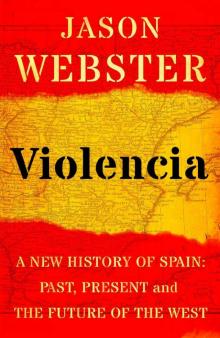 Violencia
Violencia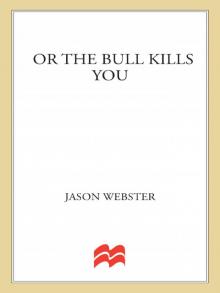 Or the Bull Kills You
Or the Bull Kills You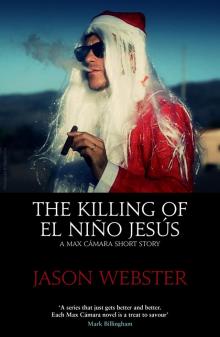 The Killing of El Niño Jesús
The Killing of El Niño Jesús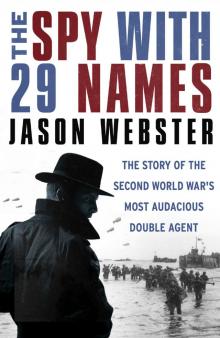 The Spy with 29 Names
The Spy with 29 Names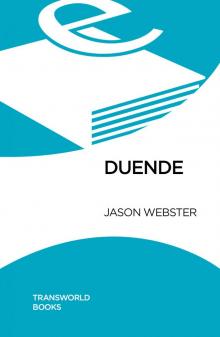 Duende
Duende Guerra
Guerra Sacred Sierra
Sacred Sierra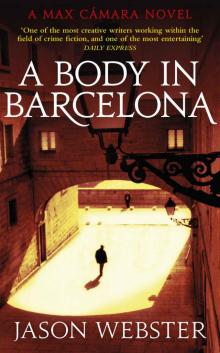 A Body in Barcelona: Max Cámara 5
A Body in Barcelona: Max Cámara 5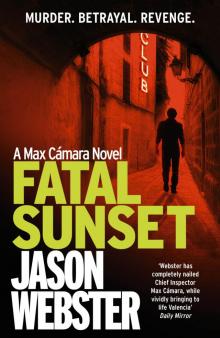 Fatal Sunset
Fatal Sunset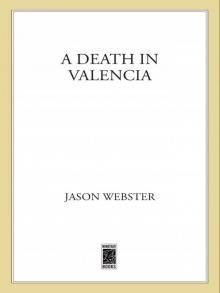 A Death in Valencia
A Death in Valencia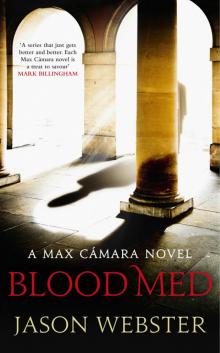 Blood Med
Blood Med Andalus
Andalus